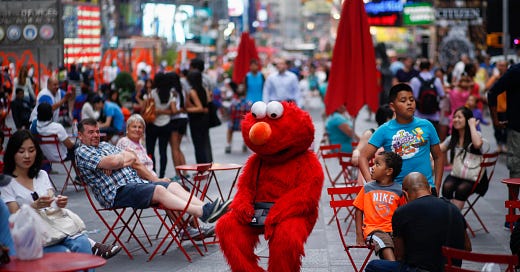This article was originally written for Mockingbird.
I arrived in New York City looking for relief. Lucky for me, the Mockingbird Conference had promised just that — Relief. Capital R. I exited the Northeast Regional train into the city with the usual bags, both the backpack slung over my shoulder and the invisible ones dragging behind me — pressure to perform, to be smart enough, kind enough, holy enough. Pastor enough. Human enough.
Enough in every area of my life.
Walking through the city, I noticed costume after costume.
Elmo taking a smoke break in Times Square while the Naked Cowboy serenaded tourists.
Costumed performers on bright billboards inviting us to shows.
After dropping my bags at the hotel, I made my way to St. George’s Episcopal Church, a church that managed to be both cavernous and cozy. As Dave Zahl opened the proceedings, it felt like something real was happening. Not real like serious, but real like truthful. People laughing and hugging one another. Old friends reunited in the city where blending in and going unnoticed is easy. Each talk felt less like an academic exercise and more like watching someone pick a lock to your prison cell. There were talks so full of grace they slipped past your defenses before you could theologize them away.
And then, as soon as I stepped outside that church and onto the New York sidewalk, I noticed it again: everyone was in costume.
I don’t mean Halloween leftovers or the guy in Times Square wearing a Spider-Man suit for tips. I mean the everyday disguises — the curated outfits, the controlled facial expressions, the stiff shoulders, the earbuds surgically implanted as armor against human interaction. I saw it in myself too, in how I adjusted my voice when I ordered coffee, in how I rehearsed my posture to look like I belonged walking along Lexington Ave. Everyone’s got a part to play, a character to protect. In New York, it just happens to be more obvious. But if I’m honest, the church isn’t that different.
It reminded me of that line from David Zahl — “Performancism is the mindset that equates our identity and value directly with our performance and accomplishments.” Preach, Dave. You know what that is? Exhausting. The kind of exhaustion that runs deeper than your Fitbit can track.
But here’s the good news: when everyone’s in costume, grace becomes even more astonishing. Because grace, like Jesus, is annoyingly uninterested in your costume. It goes behind the mask, underneath the designer theology and the self-justifying narratives, and whispers the most scandalous thing it can say: “You don’t have to keep this up.”
That’s what Mockingbird offered. Not a new costume to try on — Lord knows we’ve got enough of those already — but the invitation to take one off. To come unclenched. To hear that relief doesn’t come after you finally perfect the performance. Relief is the end of the performance. It’s when someone else takes the stage and says, “I’ve got this. You can sit down now.”
I realized that Jesus shows up in the weirdest places — not just in stained-glass sanctuaries, but in the guy barking about astrology in Union Square, in the woman weeping quietly on the A train, in the waiter who refills your water even when you’ve overstayed your welcome. I realized that grace is less like a doctrine and more like a street performer who starts singing Leonard Cohen at just the right moment, reminding you that you’re not alone in your ache. Even if it is the Naked Cowboy.
The gospel is God’s grand insult to our competence. And Lord, if that’s not relief. Because competence is the costume I cling to most. But grace doesn’t require my competence. It meets me in my incompetence, in my collapse, in my costume-change exhaustion. And it calls that very place holy.
Everyone’s in costume in New York City, but that is not unlike every other town. But maybe that just makes the cross stand out more. Maybe when everyone’s got their armor up, grace surprises us even more by being so disarmingly … kind.
Maybe, just maybe, the kingdom of God looks a little like a conference where nobody pretends to have it together, held in a city where everyone’s pretending all the time.
And maybe that’s what real relief is: not escape from the city’s masquerade, but the holy subversion of it.






